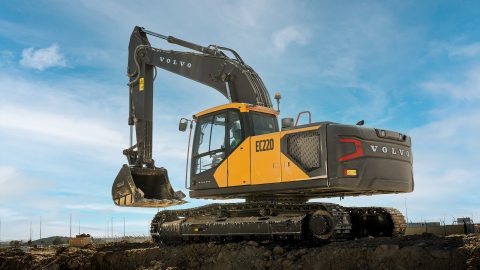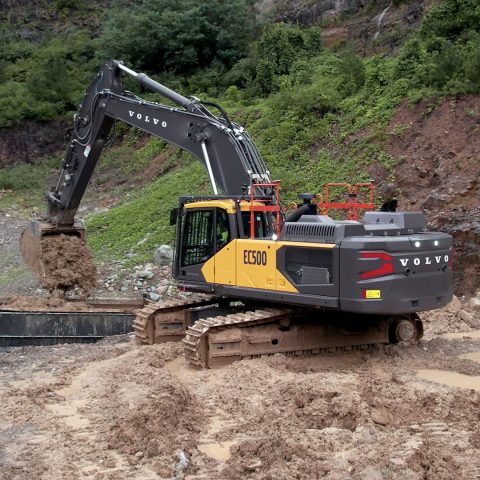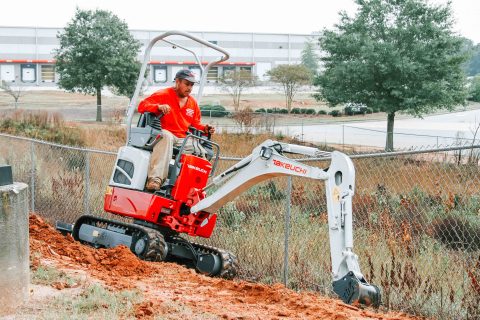How to Choose the Right Excavator Size for Your Construction Jobs
Key Takeaways: Choosing the right excavator size depends on project type, worksite conditions, lifting capacity, and budget. Mini excavators are best for tight spaces and small projects, midi models balance mobility with power, standard excavators serve most commercial jobs, and large excavators handle heavy-duty construction and mining. Construction companies should match excavator size to job requirements to maximize efficiency and ROI.
Excavators play a major role in many construction projects. If you’re thinking about purchasing a new excavator for your business, choosing the right size will be critical to ensuring your new piece of heavy equipment meets the demands of your specific applications. Choosing an excavator that’s too small will prevent you from having the power and capacity necessary to complete your projects. Purchasing an excavator that is too large can result in having equipment that won’t be able to access certain job sites, is harder to move around, and places you over budget for the jobs you take.
The following overview will help ensure you choose the right excavator size for your construction jobs. At McClung-Logan, we’re always here to discuss your needs with you in greater detail, and our team will provide customized equipment recommendations that will best address your specific projects and applications.
Understanding the Different Excavator Size Categories
There are four different sizes of excavators, and each one is built for different types of projects and applications:
- Mini/compact excavators
- Standard excavators
- Large excavators
Mini/Compact Excavators
A mini excavator, also called a compact excavator, is a type of excavator weighing under 10 tons designed for tight-space, light-to-moderate construction tasks with low ground impact. Mini and compact excavators:
- Can be transported on a Class 1 or Class 2 truck (many states don’t require a CDL to operate these trucks)
- Are the most mobile and fuel efficient size
- Offer high levels of maneuverability
- Are ideally suited for businesses working at multiple locations because they’re easy to transport
- Are more precise than larger models
- Can be operated on soft ground or finished job sites without damaging surfaces
- Are good for sewer repairs, small projects, water line installations, landscaping tasks, trenching work, utility work, residential construction, indoor projects and multi-location projects
However, the smaller size of these excavators mean they also have a shorter reach, less power, smaller lift capacity and limited digging depth compared with larger models.
Standard Excavators
 A standard excavator, often called a crawler excavator, is a full-size machine weighing roughly 10 to 45 tons, built for most commercial construction work and compatible with a wide range of hydraulic attachments. Standard excavators:
A standard excavator, often called a crawler excavator, is a full-size machine weighing roughly 10 to 45 tons, built for most commercial construction work and compatible with a wide range of hydraulic attachments. Standard excavators:
- Offer more power and reach
- Come with hydraulic systems that are capable of handling multiple tool attachments
- Offer good maneuverability and versatility
- Are good for large construction and demolition projects, site preparation, and larger foundations
Due to their size, standard excavators require a larger trailer for transportation.
Large Excavators
A large excavator is a heavy-duty machine weighing over 45 tons engineered for mass excavation, major demolition, mining, and other high-capacity applications. Large excavators:
- Offer the most power and capacity of any excavator class
- Are good for major commercial construction and demolition projects, digging foundations for large structures, mining projects and large-scale excavation work
The excessive size of these excavators come with a few drawbacks. Transportation and storage can often be a challenge (you’ll typically need an oversized trailer to move them). They also tear up the ground more easily than smaller excavator sizes. In addition, the higher purchase price will require consistent usage to ensure you experience a strong ROI on your equipment.
Excavator Size Comparison
| Excavator Size | Weight Range | Best Applications | Advantages | Limitations |
|---|---|---|---|---|
| Mini / Compact | < 10 tons | Sewer repairs, landscaping, trenching, residential jobs, utility work, indoor or tight-space projects | Highly mobile; fuel-efficient; easy transport (often no CDL required); precise; minimal ground damage | Shorter reach; lower power; smaller lift capacity; limited digging depth |
| Standard (Crawler) | 10 – 45 tons | Commercial construction, demolition, site prep, large foundations | Versatile; strong power and reach; supports multiple hydraulic attachments; widely used in the industry | Requires larger trailer transport; higher operating costs than smaller models |
| Large | 45+ tons | Mining, major demolition, large-scale foundations, heavy-duty commercial projects | Maximum power; deepest digging capacity; high load and lift capability | Expensive to buy and operate; oversized transport required; can damage ground; needs consistent use for ROI |
Factors to Consider When Choosing the Right Excavator Size
 The right excavator size for your specific needs will depend on a variety of factors, including:
The right excavator size for your specific needs will depend on a variety of factors, including:
- Digging Depth and Reach – Your excavator should be able to achieve the maximum digging depth and reach for the projects you typically handle. If one of the smaller sizes can address the vast majority of your projects, it may make sense to purchase this size and then rent a larger excavator when needed for one-off projects.
- Lifting Capacity – If you use your excavator for lifting, make sure it has the power to handle the heaviest material you move. Standard or large excavators may be required for very heavy lifts. Your equipment should also have a counterweight that matches your lifting requirements.
- Load Capacity – The excavator’s load capacity determines how much material can be moved in a single cycle and will significantly impact the speed and efficiency of your operation.
- Worksite Conditions – How tight is the space around your worksite? Do you need to dig in multiple locations? How much power is required for your specific applications?
- Hydraulic Attachments – If you work on heavy-duty projects that require multiple tool attachments, you may need to choose an excavator with a hydraulic system. Make sure the hydraulic system is compatible with the specific attachments you use.
- Fuel Efficiency – High fuel prices can eat into your profitability. Choosing a fuel-efficient excavator can reduce costs, help you stay within budget and improve your profit margins.
- Transportation and Storage – Transportation and storage requirements vary for each excavator size. Transportation and storage of standard and large excavators can get expensive, but these costs are part of doing business if you handle jobs that require these machines. If your applications can be handled by smaller sized excavators, you can significantly reduce these costs.
- Budget – Consider the upfront cost associated with purchasing your excavator equipment, hourly operating costs and ongoing maintenance costs. If you have to finance the machine, how will this affect your budget? Is renting a more economical option for your business than buying?
McClung-Logan Can Help You Determine the Right Excavator Size for Your Applications
 If you need to add an excavator to your fleet, McClung-Logan can ensure you choose the right sized equipment for your specific needs. We’ve been the leading heavy equipment dealer in the Mid-Atlantic region since 1939, and our extensive excavator inventory can address just about any application you may have.
If you need to add an excavator to your fleet, McClung-Logan can ensure you choose the right sized equipment for your specific needs. We’ve been the leading heavy equipment dealer in the Mid-Atlantic region since 1939, and our extensive excavator inventory can address just about any application you may have.
We offer a wide range of new and used excavators for sale, as well as a large fleet of rental excavators. Our inventory includes the latest models of excavators from some of the leading brands in the industry:
At McClung-Logan, we back our equipment up with our Simply Done Right Service™ Pledge to make your business more profitable. As part of this pledge, you can count on:
- 24/7 assistance
- Communication in your preferred method (phone, text or email)
- A highly trained service team
- Extensive inventory on hand to ensure you receive any parts as quickly as possible
- Loaner machines, whenever possible, to minimize your downtime when your equipment is being serviced
Contact one of our 11 branch locations to speak with a sales representative. McClung-Logan is a full-service construction equipment dealer serving the Mid-Atlantic region.
